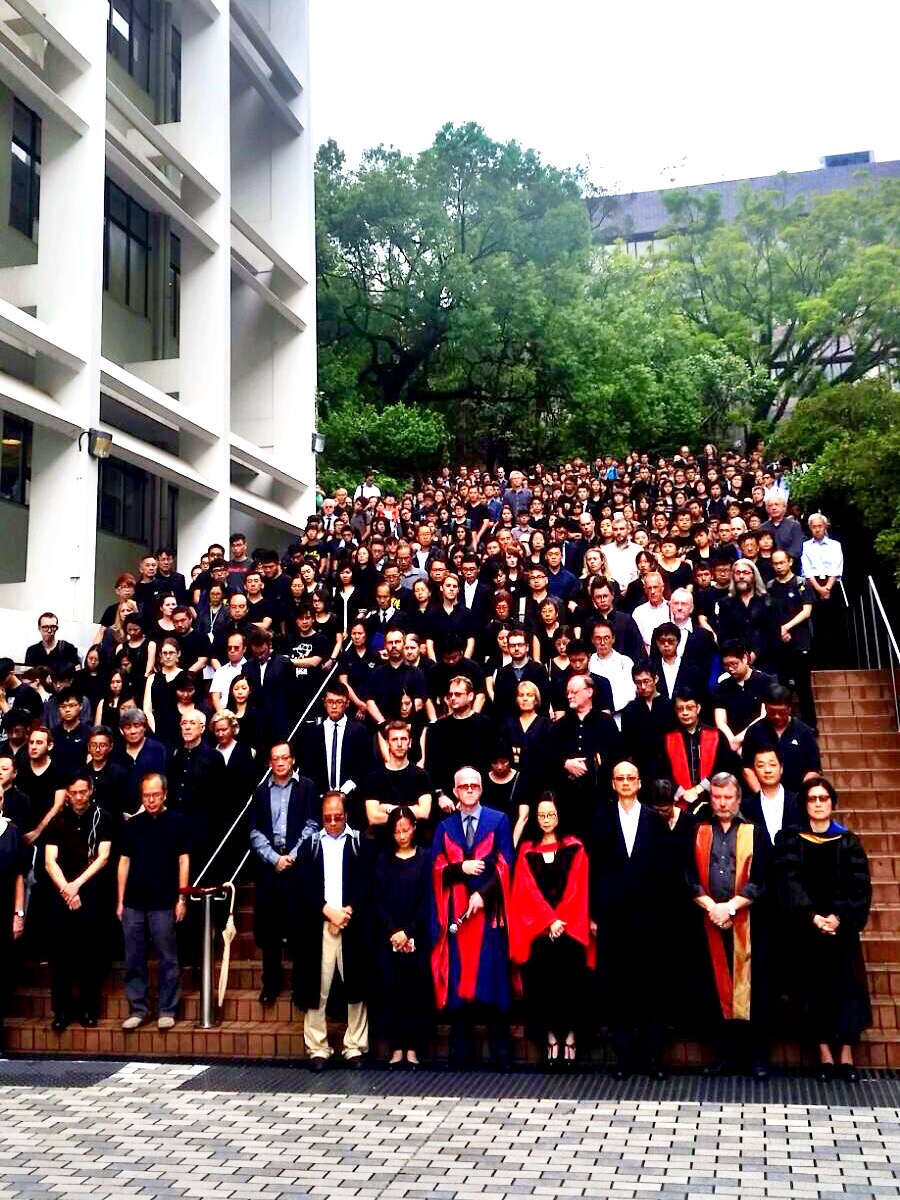
The staff and students of Hong Kong’s oldest university staged a silent but emotive protest Tuesday afternoon local time to protest what they perceive as encroachment by China on the city’s academic freedoms.
A large crowd of faculty, staff and students — organizers estimated the final number to be around 2,000 — walked in solemnity across the University of Hong Kong (HKU) campus, many in academic dress.
“We march today in silence not because we have nothing to say, not because we are mourning anything,” said Timothy O’Leary, head of the School of Humanities and one of the main organizers of the protest. “We march in silence to demonstrate to ourselves and to the city of Hong Kong what a university could be like if its academic staff and students were silent.”
Protesters also called for Hong Kong’s unpopular leader, Leung Chun-ying, to be removed as chancellor of Hong Kong’s public tertiary institutions.
The catalyst for the protest was a refusal by the university’s council on Sept. 29 to appoint a well-known liberal law professor, Johannes Chan, to a key managerial position. Chan’s candidacy for the pro-vice chancellorship was voted down by 12 votes to eight, a decision many in the academic community believe was made under pressure ultimately emanating from the central government in Beijing.
According to the South China Morning Post, the university council were said to believe that Chan lacked academic qualifications for the job. However, university law faculty members refuted this, as did an unnamed member of a search committee that recommended Chan for the position.
Chan, an outspoken advocate for human rights, headed the law school when Benny Tai, a professor at the school, launched the Occupy Central movement. Occupy Central would go on to become one of the major driving forces behind last year’s so-called Umbrella Revolution — pro-democracy protests in which over 100,000 people, mainly students, seized major streets and shut down key areas of the city for 79 days.
Chan is close to Tai, who was among the marchers today. Several colleagues consider their relationship an implicit reason for Chan’s rejection.
“University professors tend to be pretty smart, and they can see what’s going on,” said O’Leary in a telephone interview with TIME on Monday evening. “They see the Beijing government putting pressure on the Hong Kong government, they see the Hong Kong government putting pressure on different parts of Hong Kong society.”
The university’s staff and students featured prominently in last year’s democracy protests and many now feel their involvement is being punished by the Hong Kong and Chinese governments.
“It happens at the moment that the universities are in the front line,” said O’Leary.
Although the event was organized by and for faculty, more than half of those marching were students who wished to support their professors.
“I think it’s ridiculous and unreasonable,” Harin Cheung, a 25-year-old Japanese-studies major, said before the march began. “The members of the council represent the interests of the Communist Party [of China] but not the interests of the staff and students of HKU.”
“We really don’t have another way to express our frustration,” said Karina Kam, a fourth-year science student. “If we lose this academic freedom, freedom of speech and freedom of thought, what will we have in the future?”
Read next: On China’s National Day, Hong Kong Protesters Say That They Are Not Part of China
More Must-Reads from TIME
- Why Trump’s Message Worked on Latino Men
- What Trump’s Win Could Mean for Housing
- The 100 Must-Read Books of 2024
- Sleep Doctors Share the 1 Tip That’s Changed Their Lives
- Column: Let’s Bring Back Romance
- What It’s Like to Have Long COVID As a Kid
- FX’s Say Nothing Is the Must-Watch Political Thriller of 2024
- Merle Bombardieri Is Helping People Make the Baby Decision
Write to Rishi Iyengar / Hong Kong at rishi.iyengar@timeasia.com